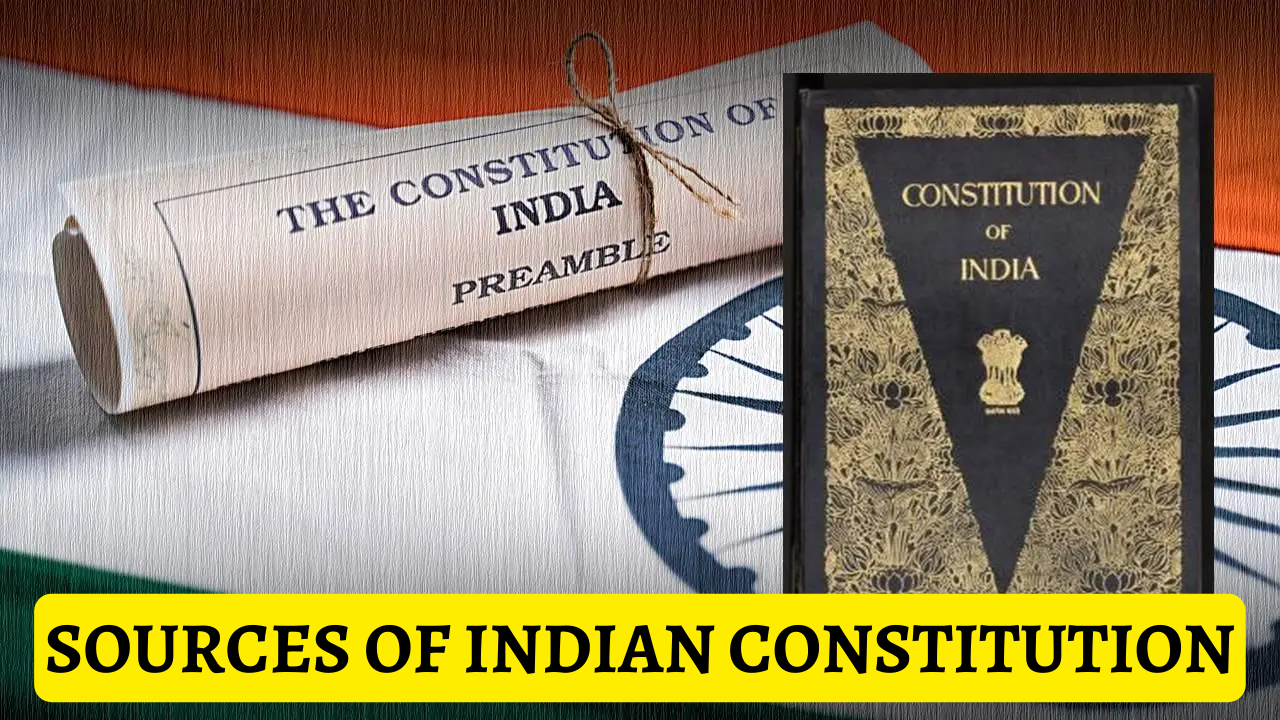
Sources of Indian Constitution: The Indian Constitution was adopted on January 26, 1950. It is the supreme law of India. It lays the foundation for the country’s political, social, and economic framework. The Indian Constitution was crafted by a team led by Dr. B.R. Ambedkar. The Constitution reflects the aspirations of a diverse and democratic nation. It enshrines fundamental rights, such as equality, liberty, and justice, ensuring the protection of individual freedoms. The Constitution also establishes a parliamentary system of government, with a President as the head of state and a Prime Minister as the head of government. It stands as a testament to India’s commitment to upholding democratic principles and fostering a just society.
For several reasons, studying the Sources of the Indian Constitution is crucial for UPSC aspirants. Firstly, understanding the sources provides insights into the ideological, historical, and philosophical foundations of the Indian Constitution. It exposes aspirants to various constitutional models and rights frameworks, enhancing their understanding of the principles that influenced the framers.
Secondly, it helps aspirants appreciate the unique blend of indigenous wisdom and international experiences that shaped the Constitution. By exploring ancient Indian texts and teachings of freedom fighters, they gain a deeper understanding of India’s heritage. Additionally, knowledge of the sources enables aspirants to interpret and analyze constitutional provisions effectively, critically evaluate legal and policy issues, and propose informed reforms.
Lastly, questions related to the sources appear frequently in the UPSC examination. A comprehensive understanding of these sources allows aspirants to answer such questions effectively, showcasing their knowledge and analytical skills. Overall, studying the sources of the Indian Constitution equips UPSC aspirants with a comprehensive understanding of its origins, influences, and contextual relevance, enabling them to contribute meaningfully to governance and development.
The Indian Constitution was crafted by a team led by Dr. B.R. Ambedkar. It enshrines fundamental rights, such as equality, liberty, and justice, ensuring the protection of individual freedoms. Below mentioned are the list of features of the Indian Constitution adopted by different countries.
| Borrowed Features of the Indian Constitution with Sources | ||
|---|---|---|
| S. No. | Country | Features Adopted |
| 1. | Australia | – Concurrent list – Freedom of trade, commerce and intercourse – Joint-sitting of the two Houses of Parliament |
| 2. | Canada | – Federation with a strong Centre – Vesting of residuary powers in the Centre – Appointment of state governors by the Centre – Advisory jurisdiction of the Supreme Court |
| 3. | Ireland | – Directive Principles of State Policy – Nomination of members to Rajya Sabha – Method of election of the president |
| 4. | Japan | Procedure Established by law |
| 5. | Soviet Union | – Fundamental duties (USSR/Russia) – Ideals of justice (social, economic and political) in the Preamble |
| 6. | UK | – Parliamentary government – Rule of Law – Legislative procedure – Single Citizenship – Cabinet system – Prerogative writs – Parliamentary privileges – Bicameralism |
| 7. | US | – Fundamental rights – Independence of judiciary – Judicial review – Impeachment of the president – Removal of Supreme Court and High Court judges – Post of vice-president |
| 8. | Germany | – Suspension of Fundamental Rights during emergency (Weimar) |
| 9. | South Africa | – Procedure for amendment in the Indian Constitution – Election of members of Rajya Sabha |
| 10. | France | – Republic – Ideals of liberty, equality and fraternity in the Preamble |

The question of whether the Indian Constitution is a “borrowed bag” is addressed with a nuanced understanding from the perspective of UPSC aspirants. While it is acknowledged that the Indian Constitution draws inspiration from various sources, it is not seen as a mere collection of borrowed provisions. The framers of the Constitution, led by Dr. B.R. Ambedkar, meticulously examined constitutional models from different nations and adapted them to address independent India’s specific needs and aspirations.
The Constitution incorporates provisions from countries like the UK, the US, Canada, and Australia. However, it is important to note that these provisions were not blindly replicated but were modified and contextualized to suit the Indian socio-political landscape. The Constitution also embraces indigenous elements, reflecting the intention to preserve India’s cultural heritage.
Therefore, UPSC aspirants recognize the Indian Constitution as a thoughtful synthesis of borrowed features and indigenous principles tailored to India’s unique context.
The sources of the Indian Constitution include various elements such as the Constituent Assembly debates, historical documents, international constitutions, ancient Indian texts, and the ideas of Indian freedom fighters.
The framers drew from diverse sources to create a comprehensive and inclusive Constitution. They aimed to incorporate the best elements from different constitutional models, adapt them to India's context, and reflect the aspirations of the Indian people.
The framers drew inspiration from international constitutions such as those of the United States, the United Kingdom, Canada, Australia, Ireland, and South Africa. These sources influenced provisions related to fundamental rights, parliamentary government, federation, advisory jurisdiction of the Supreme Court, and more.
The ideas of Indian freedom fighters like Mahatma Gandhi influenced the inclusion of principles such as non-violence, social justice, and equality in the Indian Constitution. Their vision of a just and inclusive society had a significant impact on the framing of the Constitution.
No, the framers did not blindly copy provisions from other sources. They carefully examined and adapted borrowed features to suit India's unique needs, socio-political context, and aspirations, ensuring the Constitution reflected the country's specific requirements.
<div class="new-fform">
</div>
